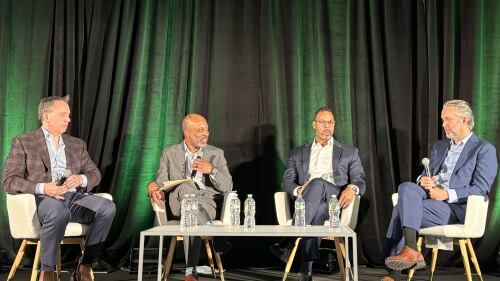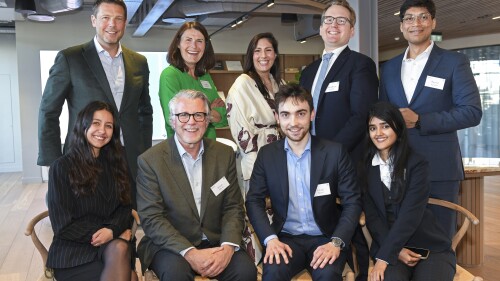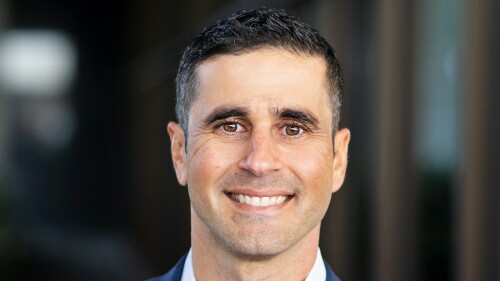Public-private partnerships have helped drive Houston’s remarkable transformation in recent years, in part by replacing deteriorating areas with vibrant green spaces that not only make the nation’s fourth-largest city more livable, but stimulate development and raise property values around them.
But in order for that formula to succeed in Houston and elsewhere, energy industry entrepreneur and civic philanthropist Rich Kinder warns that it is essential for private donors to show the same sort of toughness and financial savvy that helped them make their business fortunes.
In particular, it is crucial to negotiate tough long-term deals with the public sector to ensure that tax structures are created to maintain their philanthropic projects for decades after they are built, and that those financing streams are protected from shifts in elected political leadership.
“The big fear of private entrepreneurs is that you put up the money, and then the support doesn’t turn out to be there in successive administrations,” explained Kinder who achieved his own success as the chief executive and chairman of energy pipeline firm Kinder Morgan. After co-founding the company in 1997, Kinder’s leadership helped it to become the third biggest energy company in North America, with 12,000 employees and a value of $130 billion, according to the Kinder Morgan website.
As civic entrepreneurs, Kinder and his wife, Nancy G. Kinder, have had a similarly major impact upon Houston. One major example is Discovery Green, a 12-acre (5 ha) park in the heart of downtown Houston, created in the mid-2000s from what once was a pair of parking lots. “This was a dying several-block area,” Kinder said.
Nancy Kinder, who runs the Kinder Foundation with her husband, helped lead a group of philanthropists who approached then-Mayor Bill White with the idea of turning the site, part of which already had been acquired by the city, into an urban park. The Kinder Foundation contributed $10 million toward the project’s eventual $180 million cost, and Nancy Kinder served as the founding chair of the Discovery Green Conservancy, which built and still operates the park.
The $180 million park has turned into a recreational attraction that draws more than 1 million visitors each year and stages some 600 public events. Moreover, it has become an anchor for $625 million in real estate development along its periphery, with another $1 billion in projects in the pipeline, according to the Discovery Green website.
“This hotel (the Hilton Americas-Houston) wouldn’t be here without it,” noted Cushman & Wakefield of Texas Executive Vice-Chairman Tim Relyea, who introduced Kinder to the ULI audience.
But Kinder, who described Discovery Green as an “urban jewel,” said the project would not have been feasible without the creation of a tax increment reinvestment zone, or TIRZ. That funding structure sets aside a portion of tax revenues from development in an area to fund improvements and upkeep.
“It’s important to get such commitments in writing,” Kinder said.
The Kinder Foundation has played a similar role in the creation of Buffalo Bayou Park, another major green space project in Houston, by contributing $30 million toward its $58 million cost. As with Discovery Green, a TIRZ set up by the city will provide millions in ongoing funding for the park’s maintenance and operations.
Kinder was particularly proud of Buffalo Bayou’s transformation, noting that he used to jog along the waterway back when the area was decaying. “It was really a disaster area,” he said. “You never knew what you would find around the next corner—a beer bottle, or a syringe.” Today, the three-mile (5 km) strip includes urban amenities such as dog parks in which residents can let their pets frolic in the water.
“It’s too grandiose to say this, but I will anyway—this could be our Central Park,” Kinder said.
His foundation is involved in an even more sweeping project, the Bayou Greenway Initiative, which aims to acquire and improve land along ten local waterways. “Eventually, two thirds of the people of Houston will live within a mile of 150 miles of park trails,” he said. (Within 1.6 km of 241 km of trails.)
Kinder said that private donors need to bring the same sort of market-driven discipline to urban redevelopment projects that they apply to business ventures. “I think the modern philanthropist wants to get a return on an investment, instead of just giving to his alma mater,” he said. A key part of that return is sustainability, he added.
“Every project needs to have sustainability and to be able to stand on its own two feet,” Kinder said. “The philanthropist can’t be there forever, and you don’t want him to be.”
One important safeguard for such investments is to give responsibility for doing maintenance, and the funding to perform it, to a public/private partnership rather than leave it up to a government agency. Such an arrangement allows private donors to maintain accountability.
Kinder said that the private sector’s leading role in transforming Houston’s land use fits the city’s character. “In Houston, we’ve got an entrepreneurial mindset,” he explained. “There’s not much of a social hierarchy here. People who move the city forward aren’t afraid to think big…The city was built on the back of free enterprise.” But success, he said, also creates civic responsibility.
“It’s incumbent upon people who made money to put money back in,” Kinder said.




![Western Plaza Improvements [1].jpg](https://cdn-ul.uli.org/dims4/default/15205ec/2147483647/strip/true/crop/1919x1078+0+0/resize/500x281!/quality/90/?url=https%3A%2F%2Fk2-prod-uli.s3.us-east-1.amazonaws.com%2Fbrightspot%2Fb4%2Ffa%2F5da7da1e442091ea01b5d8724354%2Fwestern-plaza-improvements-1.jpg)

